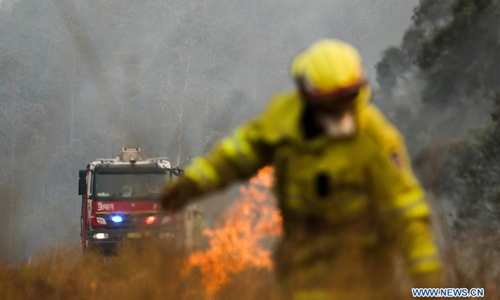HOME >> WORLD
South Australia commits to climate action following bushfire crisis
Source:Xinhua Published: 2020/1/31 13:42:52

Photo taken on Nov. 11, 2019 shows the bushfire in Taree in New South Wales, Australia. The Australian government launched the National Bushfire Recovery Agency which would be funded with an initial two billion Australian dollars (1.38 billion U.S. dollars) on Monday. Photo:Xinhua
The Premier of the South Australia State of Australia has promised to tackle climate change in 2020 in order to mitigate the impact of future bushfires.
South Australia has been one of the states hit hardest by the nation's ongoing bushfire crisis, with three people dead and more than a third of Kangaroo Island off the state's coast burned.
Speaking to News Corp Australia before the state's Parliament resumes in February, Premier Steven Marshall on Friday committed to addressing climate change.
Amid growing public concerns about the impacts of climate change, Marshall estimated that three quarters of the state's energy will come from renewable sources by 2025, up from half in 2020.
Marshall's conservative Liberal Party won power in SA in 2018 after a record 16 years in Opposition.
"It has changed the psyche of the people of SA, and Australia," he said.
"There were a whole pile of people that were wavering on their interest in regards to climate resilience and adaptation.
"There was probably a fear amongst some people that a new Liberal government might move away from a direction that had been set in terms of climate.
"Any reasonable independent view of what has happened shows that we have actually put our foot down."
The SA Government in December 2018 released a "climate smart" strategy detailing how it will reduce emissions. Marshall has previously promised that the state's greenhouse gas emissions will be net zero by 2050.
Marshall conceded that "no matter what we do in SA we are not going to change global weather patterns" but said that the state would still do its part.
"It's how you adapt when you have got a changing climate," he said.
Posted in: ASIA-PACIFIC